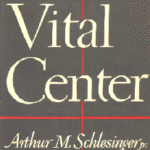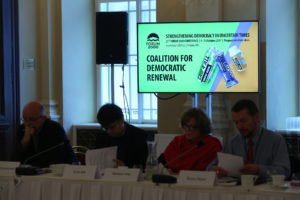 President Biden grew up in the world of Cold War liberal anti-communism, associated with the historian Arthur Schlesinger, the author of “The Vital Center”; the labor leader Walter Reuther; and the theologian Reinhold Niebuhr, founders, along with Hubert Humphrey, of Americans for Democratic Action. We should not be surprised that he has turned back to that moment, and to that language, at a time when democracy once again seems threatened by authoritarianism, argues Foreign Policy columnist James Traub.
President Biden grew up in the world of Cold War liberal anti-communism, associated with the historian Arthur Schlesinger, the author of “The Vital Center”; the labor leader Walter Reuther; and the theologian Reinhold Niebuhr, founders, along with Hubert Humphrey, of Americans for Democratic Action. We should not be surprised that he has turned back to that moment, and to that language, at a time when democracy once again seems threatened by authoritarianism, argues Foreign Policy columnist James Traub.
“The triumph of democracy and liberalism over fascism and autocracy created the free world,” Mr. Biden wrote in a recent essay in Foreign Affairs. “But this contest does not just define our past. It will define our future, as well.”
Democracies have the capacity for self-renewal, Traub writes in the Times:
F.D.R. preserved American democracy — and capitalism — through the drastic medicine of the New Deal. Elsewhere, democracies have regained their footing after sliding into dictatorship, as India did after Prime Minister Indira Gandhi declared the emergency of 1975-7. Democratic renewal requires a widely shared faith in fundamental norms — the rule of law, the rights of the individual, the equality of all citizens. Can we still draw upon that resource?

21st Forum 2000 Conference
A politics of democratic renewal would once again bind together domestic and foreign affairs, Traub adds:
Mr. Biden has in fact argued that such a policy must begin with a reassertion of moral principle at home by banning torture and ending the gross mistreatment of migrants at our borders. Only then, having restored at least a measure of legitimacy, would Mr. Biden seek to revitalize the tattered global order by convening what he calls a “summit of democracy” in order to build a unified response to both autocratic states and backsliding democracies.







